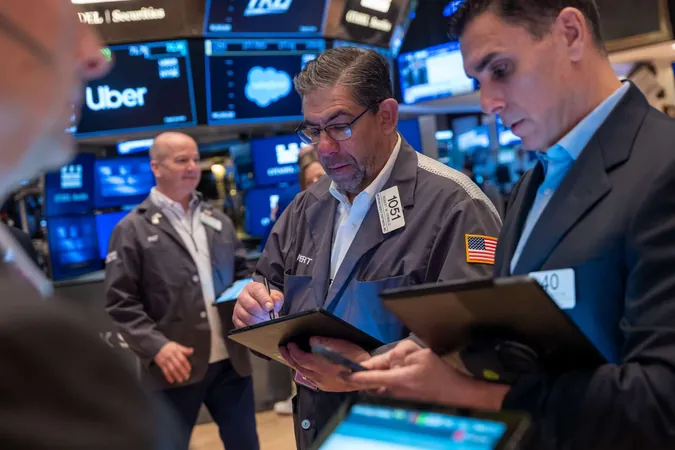
The Anticipated Trump-led M&A Surge: Why It's Falling Flat, At Least for Now
2025-03-28
Author: Yan
Amid the post-election optimism following Donald Trump’s return to the presidency, Wall Street initially buzzed with excitement over the potential for a boost in merger and acquisition (M&A) activity. Hopes of decreased taxes, relaxed regulations, and an easing of antitrust enforcement seemed to set the stage for a revival in deal-making. However, as of now, the anticipated M&A boom has not materialized.
The M&A landscape had already been on a downtrend since 2021, largely due to the aggressive antitrust stance of President Joe Biden's administration and the Federal Reserve’s series of interest rate hikes initiated in March 2022 to combat rising inflation. During this period, private equity firms amassed a hefty collective cash reserve of around $1 trillion, known in the industry as “dry powder,” yet remained reluctant to divest from their existing holdings.
With the Federal Reserve finally signaling rate cuts and Trump back in the political driver's seat, many believed this was the opportune moment for M&A activity to surge. Unfortunately, various factors, notably Trump’s inconsistent tariff policies and their potential impact on inflation, have left investment bankers increasingly anxious. Mike Mayo, a managing director at Wells Fargo Securities, notes that the unpredictable nature of Trump’s policies has created a sense of paralysis among investors, raising fears that significant market movements might not occur until later in the year.
Data from Dealogic indicates that there were 2,006 M&A announcements in the U.S. as of March 24, 2025—a staggering 24% decrease from the same period in 2024 and a 45% drop from 2021's figures. The decline marks the lowest early-year deal volume in over a decade, coupled with a bleak outlook. In February alone, the number of U.S. deals worth $100 million or more tumbled 33% compared to January.
While there remains a glimmer of hope for future activity, industry players cautiously predict that any significant resurgence may not materialize until later in the year. Larry DeAngelo, co-head of corporate finance at Houlihan Lokey, emphasizes that the market's current state reflects uncertainty rather than a mere hiatus.
Furthermore, Trump's approach to trade negotiations has only compounded market volatility. Investors are reacting to his unpredictable tariff threats, which, coupled with a bearish stock market—evidenced by a 7% dip in the S&P 500 since February—has made deal-making more challenging. Major financial firms like Blackstone, KKR, Apollo, and Carlyle have seen their valuations suffer, decreasing by around 30% since the post-election highs, while investment banks such as Goldman Sachs and Morgan Stanley are down approximately 20%.
Despite the downturn, some unexpected activity has emerged; notable deals like Google’s $32 billion acquisition of cybersecurity firm Wiz signal ongoing interest in large-scale transactions. This deal, described as Google’s largest acquisition to date, is anticipated to receive more favorable scrutiny under a Trump administration than it might have under Biden's.
However, regulatory scrutiny remains a concern. Andrew Ferguson, Trump’s new FTC chairman, indicated that existing antitrust guidelines from the Biden administration would still be followed. This reflects a dual commitment to both conservative policies and populist interests, complicating hopes for a quick turnaround in the M&A landscape.
Moreover, a recent report suggested the Justice Department harbors reservations regarding Capital One's planned $35 billion acquisition of Discover Financial, although both companies are still working toward completion by May. Previous regulatory hurdles like those faced by Nippon Steel in its attempt to acquire U.S. Steel remain relevant, indicating that foreign acquisition bids may still face significant scrutiny.
Despite the current slowdown, the M&A field does hold potential avenues for growth. An aging cohort of Baby Boomer business owners, along with greater pressure on private equity firms to divest assets, could unlock future activity. Currently, many private equity funds have held onto assets for over 6.7 years, surpassing the 5.7-year historical average, resulting in a backlog that heightens the urgency to re-engage with the market.
As buyers exercise caution and wait for clearer market indicators, varying expectations between buyers and sellers are creating challenges in deal negotiations. Experts caution that without a comparative guide from similar recent deals, reaching consensus on valuations could prove complicated.
Ultimately, while the market currently appears stagnant, the anticipation of lower interest rates and changes in regulatory landscapes could ignite a resurgence in M&A activity in the months ahead—provided clarity emerges on Trump's policies and the broader economic outlook.



 Brasil (PT)
Brasil (PT)
 Canada (EN)
Canada (EN)
 Chile (ES)
Chile (ES)
 Česko (CS)
Česko (CS)
 대한민국 (KO)
대한민국 (KO)
 España (ES)
España (ES)
 France (FR)
France (FR)
 Hong Kong (EN)
Hong Kong (EN)
 Italia (IT)
Italia (IT)
 日本 (JA)
日本 (JA)
 Magyarország (HU)
Magyarország (HU)
 Norge (NO)
Norge (NO)
 Polska (PL)
Polska (PL)
 Schweiz (DE)
Schweiz (DE)
 Singapore (EN)
Singapore (EN)
 Sverige (SV)
Sverige (SV)
 Suomi (FI)
Suomi (FI)
 Türkiye (TR)
Türkiye (TR)
 الإمارات العربية المتحدة (AR)
الإمارات العربية المتحدة (AR)